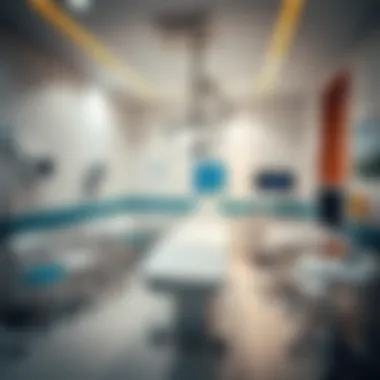Understanding the Medical Check-Up for Dubai Residence Visa


Intro
Navigating the residency process in Dubai can be a winding road, but the medical check-up component is a straight shot that requires your attention. When you set foot in this bustling city, teeming with life and opportunities, one of the hurdles you must tackle to secure your residence visa is the medical examination. Understanding its requirements helps you steer clear of potential pitfalls that could derail your plans in this thriving market.
A solid grasp of what the medical check entails, the clinics that conduct these exams, and the implications of varying test results is crucial. It’s a piece of the bigger puzzle for expatriates and investors looking to plant roots in Dubai, where the real estate landscape is continually evolving. This section sets the stage by offering insights into the current trends, procedures, and the broader context surrounding these medical assessments.
While some might see the medical check as just another bureaucratic checkbox to tick off, it's much more than that. Results from this examination bear consequences for your residency applicability, making it an essential step in the whole process. Let’s delve deeper into what you can expect ahead, keeping both clarity and practicality in mind.
Preface to Residence Visa in Dubai
Dubai, a vibrant hub known for its cutting-edge developments and cosmopolitan lifestyle, attracts individuals from around the globe. For those wishing to stay long-term, obtaining a residence visa is not merely a formality; it’s a gateway into the intricate social and economic landscape of the United Arab Emirates. The process is multifaceted, requiring careful navigation to meet the regulations set by the local authorities.
In this article, we delve into the significance of the residence visa in Dubai and its related medical check-up process. By highlighting the steps and challenges involved, we aim to equip investors, expatriates, and prospective homebuyers with the knowledge they need to make informed decisions in their pursuits.
Definition and Importance
A residence visa in Dubai is a legal document that authorizes non-UAE nationals to live, work, or study in the emirate for an extended period. This visa can be tied to employment, business setups, or family sponsorship. Securing this status not only grants one the right to reside in a dynamic city but also opens doors to various opportunities including educational privileges, property ownership, and access to financial services.
Moreover, understanding the requirements is pivotal, as the process can be cumbersome without the right guidance. The medical check-up, a key component of this process, is likely to raise eyebrows, but it serves a fundamental purpose – ensuring public health and safety within the community.
Who Needs a Residence Visa?
The necessity for a residence visa in Dubai can be classified into various categories:
- Expatriate Workers: Foreign nationals seeking employment in Dubai must secure a residence visa to legally work and live in the city.
- Investors: Individuals investing in businesses or properties can apply for a residence visa tied to their investments.
- Family Members: Spouses and dependents of those who hold employment or investor visas may also require residence visas to stay in Dubai.
- Students: Those enrolled in educational institutions will need a residence visa connected to their academic pursuits.
In essence, anyone looking to make Dubai their home for an extended period falls under the umbrella of needing a residence visa. The landscape of residency is quite dynamic and adjusting to changes in laws and regulations is crucial.
Understanding the need for a residence visa is step one; it sets the stage for everything that follows in terms of legal residency in Dubai.
Overview of the Medical Check-Up Requirement
When it comes to securing a residence visa in Dubai, the medical check-up is a major hurdle that cannot be skipped. It’s not just a formality; the medical examination plays a crucial role in determining the eligibility of applicants. This part of the visa process isn’t merely a checkmark on a list, but rather a vital step that highlights the health status of individuals moving to the UAE.
The significance of this medical check extends beyond personal health. It serves the wider community by ensuring that anyone granted residency is free from communicable diseases. By enforcing these regulations, the authorities are fostering a healthier environment for both locals and expatriates in the emirate.
Purpose of the Medical Examination
The main aim of the medical examination is to serve public health. The screenings are designed to identify any potential health risks, especially those diseases that are contagious or critical, impacting both individuals and communities.
- Health Screening: The medical check-up typically includes various tests, like blood tests and X-rays, that screen for diseases such as HIV, hepatitis, and tuberculosis. Such measures mean that the UAE can prevent the spread of serious health issues and maintain the wellness of its population.
- Public Safeguard: By conducting these tests, the government prioritizes overall well-being. It can be said that a healthy society is a prosperous society, and these checks help keep it that way.
- Documentation Requirement: Furthermore, a clear health report forms part of the visa application, making it a mandatory piece of documentation for those seeking to live and work in Dubai. This helps streamline the visa processing as all parties involved can have clear expectations.
In reality, while some applicants may feel put out by the process, it’s essential to recognize how these medical checks contribute to a greater social responsibility.
Legal Framework Governing Medical Checks
The medical examinations for residence visais backed by a set of laws and regulations that provide the framework for how these checks are conducted.
- Regulatory Bodies: The Dubai Health Authority is the primary body overseeing health compliance. By establishing clear guidelines for medical screenings, they ensure uniformity across all authorized medical facilities. This guarantees that every applicant experiences the same standard of care and scrutiny.
- Legal Obligations: The laws stipulate not only the types of tests required but also specify the need for certified medical professionals to undertake these examinations. This legal framework plays a major role in protecting both health standards and the rights of applicants.
"Understanding the legal aspects of the medical check-up process is crucial for navigating the visa application successfully."
- Updates and Changes: It's also worth noting that regulations can evolve, which is why staying informed about legal changes related to medical checks is important. Applicants should be proactive in checking for any updates to requirements to avoid delays in their residency application process.
By managing medical examinations through robust regulations, Dubai effectively addresses health risks while facilitating a smooth residency experience for expatriates and investors alike.
Types of Medical Tests Conducted
Understanding the types of medical tests conducted during the residence visa medical check-up is essential for any expat looking to settle in Dubai. These tests verify the overall health of applicants and aim to prevent the spread of communicable diseases within the emirate. Knowing the testing requirements not only helps streamline the visa application process but also ensures that applicants are prepared for what lies ahead. Here, we delve into the key tests conducted during this evaluation.


Blood Tests
Blood tests are at the forefront of this medical check-up process. They serve as a primary screening tool, helping to identify potential health concerns that could affect residency status. The most notable blood tests include HIV, Hepatitis B and C, and Syphilis screening, each designed to assess the applicant's health comprehensively.
HIV Test
The HIV test holds significant importance in the medical evaluation related to residence visas. Its primary aim is to determine whether an individual is infected with the human immunodeficiency virus. This test is commonly requested and has become a standard procedure in Dubai for expats. The key characteristic of the HIV test lies in its ability to yield results quickly, often within a matter of hours. This efficiency makes it a favored choice, as it allows individuals to swiftly move on to the next steps in the visa application.
A unique feature of the HIV test is that it can be conducted using a simple blood sample, making it less invasive compared to other testing methods. Additionally, the test can provide peace of mind for applicants, as knowing one's HIV status is not only vital for personal health but also crucial for public health considerations within the community. However, it is worth noting that a positive result can complicate visa applications, requiring further evaluation and consultation.
Hepatitis B and
Hepatitis B and C screening are critical components of the medical check-up. These tests evaluate the presence of viral infections that can lead to serious liver complications. Like the HIV test, this screening is essential for maintaining the health of both the individual and the larger community. The characteristic trait of these tests is their dual focus on both Hepatitis B and C, offering a comprehensive assessment of the applicant's liver health.
What sets this screening apart is its dual test mechanism, making it a highly beneficial choice—it catches more than one potential issue at a time. However, one must consider that a positive result necessitates further medical intervention and could delay the visa process, emphasizing the importance of early detection and treatment.
Syphilis Screening
Syphilis screening, though perhaps less commonly highlighted, remains a crucial aspect of the medical evaluation process. This test checks for the presence of the bacteria that causes syphilis, another sexually transmitted infection. The significance of this test extends beyond personal health; it contributes to the broader public health mission of preventing the spread of infectious diseases.
The unique feature of syphilis screening lies in its ability to be administered relatively quickly and is often included in routine blood work. This makes it a hassle-free addition to the array of necessary tests. However, a notable downside is that a positive result might lead to further medical assessments, which can create anxiety for applicants navigating the visa process.
X-Ray Examinations
X-Ray examinations, particularly the chest X-ray for tuberculosis screening, are another pillar of the medical check-up. These X-rays play a vital role in identifying potential pulmonary issues that could affect both the individual and society as a whole.
Chest X-Ray for Tuberculosis Screening
The chest X-ray is specifically aimed at screening for tuberculosis (TB), a disease that poses a significant risk in community health. This examination is critical because TB can spread easily, making early detection paramount. The key characteristic of this X-ray examination is that it can reveal signs of TB even before symptoms manifest, allowing for timely intervention.
One of the main advantages of the chest X-ray is its non-invasive nature; it provides crucial insights without the need for more invasive procedures. However, while a normal result is straightforward, in cases where abnormalities are detected, it can lead to further tests and potential roadblocks in the visa application process.
Additional Health Assessments
Apart from blood tests and X-ray examinations, additional health assessments can also form part of the medical check-up. These may include a general physical examination and additional screenings as deemed necessary by the medical professional. These assessments provide a holistic view of the applicant's health, ensuring that no stone is left unturned in verifying fitness for residency.
Understanding these specific medical tests is vital for any expatriate planning to establish residency in Dubai. Each screening serves a specific purpose, contributing to the overall health security of the community. By grasping the importance of these tests, applicants can better prepare themselves for the medical check-up process, ensuring a smoother path toward obtaining their residence visa.
Authorized Medical Facilities in Dubai
Navigating the intricacies of securing a residence visa in Dubai heavily hinges on the choice of authorized medical facilities. These institutions not only administer the necessary medical tests but also ensure that the results are valid under the regulatory standards set forth by the Dubai health authority. The significance of utilizing approved entities cannot be stressed enough—it plays a pivotal role in achieving a successful visa application. Failing to choose the right facility can lead to unnecessary delays or even outright rejections of your application, making knowledge in this area essential for expatriates and investors alike.
Selecting the appropriate medical center often involves understanding key factors such as the types of services offered, the accessibility of the locations, and the overall reputation of each facility. Overall, opting for a certified medical center can smooth out the medical check-up process, allowing you to shift your focus towards other critical aspects of your residency journey.
Government Hospitals
In Dubai, government hospitals stand as a cornerstone in the medical landscape, equipped to handle the residence visa medical check-ups effectively. Facilities like Dubai Hospital and Al Qassimi Hospital are widely recognized for their comprehensive services and are mandated to adhere strictly to the guidelines imposed by health authorities.
- Quality Assurance: Government hospitals follow a high standard for medical procedures and equipment, ensuring that the tests are conducted with utmost precision.
- Cost-Efficiency: Often, government facilities incur lower fees for medical examinations compared to private centers, which can greatly benefit those on a budget.
- Accessibility: With multiple locations across Dubai, getting an appointment is generally more straightforward, and wait times can be shorter, although it can vary.
Most importantly, the results generated by government hospitals are automatically accepted by the immigration authorities, which adds another layer of security to your application.
Private Medical Centers
On the other hand, private medical centers offer a different experience altogether. Facilities such as Mediclinic City Hospital and NMC Specialty Hospital are examples of private entities that have gained popularity among expatriates for their swift services and willing flexibility.
Advantages of Private Centers:
- Reduced Waiting Time: Private facilities often provide a quicker turnaround time for appointments and results, which can be a blessing in a bustling city like Dubai.
- Customer Service: With more focused patient care, these centers often showcase a higher level of customer service, which can ease the stress of the medical check-up process.
- Advanced Technology: Many private hospitals are equipped with the latest medical technology, ensuring a comprehensive assessment of your health.
Nevertheless, it is important to be aware that not all private hospitals hold the same level of accreditation that government institutions possess, so conducting thorough research before visiting is crucial.


It’s advisable to check online for reviews and ratings of each medical facility, as this could provide invaluable insights into the patient experience and overall obedience to health regulations.
Understanding Medical Check-Up Results
Understanding the results of your medical check-up is a crucial step in the residence visa process in Dubai. This section sheds light on the significance of these results, as they not only determine your eligibility for residency but also reflect your overall health status. Navigating through the medical results effectively can save you time and potential obstacles later on.
Interpreting Results
Clear Results
Clear results signify that you have passed all necessary medical tests, indicating a clean bill of health. This type of result is beneficial as it directly fosters the approval of your residence visa application. The essential characteristic of clear results is simplicity; they provide straightforward confirmation of your health status without complications. Such clarity is undeniably advantageous because it allows you to proceed with your application smoothly, ensuring that you can begin your new life in Dubai without unnecessary delays. One unique feature of clear results is their universal acceptance across different medical institutions, which reinforces their credibility. In this context, receiving clear results can be viewed as a straightforward green light that eliminates hassle.
Reported Issues
On the flip side, reported issues can complicate matters significantly. When test results indicate health concerns, it often leads to additional scrutiny and may require follow-up examinations or treatment. The main trait of reported issues is that they highlight areas needing attention, which can be a double-edged sword. While this might lead you to seek medical assistance and improve your health, it can also postpone your residency application process. Reported issues present a unique challenge; they may require documentation of treatment that, if not handled correctly, can introduce further delays. Thus, it’s crucial to address any medical concerns proactively to minimize their impact on your visa application.
Possible Causes of Rejections
Health Conditions
Health conditions are a predominant reason for visa application rejections. Specific communicable diseases identified in the medical examination can disqualify applicants. The critical element to note about health conditions is their serious implications. They not only affect visa eligibility but can also influence the length of time it takes to resolve health issues. This aspect plays a significant role in maintaining public health standards in Dubai. Moreover, some health conditions may require documentation proving that you have undergone appropriate treatment or are not a risk to public health. Each issue carries its own set of challenges, making it vital for applicants to be aware of how their health can directly affect their residency chances.
Documentation Errors
Documentation errors are another common pitfall that can lead to rejections. These can arise from miscommunication between the medical facility and the visa issuing authorities or due to missing information on submitted documents. The primary concern with documentation errors is that these issues can be easily avoided with proper attention to detail. However, they often go unnoticed, causing unnecessary stress and complications in the residency process. Importantly, a rejected application due to documentation errors can often be rectified, but this demands time and effort. Thus, ensuring all forms and supporting documents are complete, accurate, and clearly presented is paramount to smoothing out the visa application process.
“The devil is in the details”—ensure that every piece of information is correct to avoid headaches later on.
For those navigating the medical check-up process for a residence visa in Dubai, knowing how to interpret these results is pivotal. Pay close attention to every detail; each result—whether clear or concerning—carries significant weight in your residency journey.
Procedures Following Medical Check-Up
Once the medical check-up is completed, the path to securing a residence visa in Dubai doesn’t end there. The procedures that follow are crucial and act as a bridge connecting the medical examination results to the ultimate goal of obtaining residency status. Understanding these steps can alleviate confusion and help applicants streamline their visa processing.
Submitting Medical Results
Submitting the medical results is a vital element in the visa application process. After the checks are done, the results must be filed appropriately. This can usually be done at the medical facility where you underwent the examination, or you might be given a physical copy to submit. Here are some key points to keep in mind:
- Timeliness: Submissions should ideally happen ASAP. There’s often a window period within which these results should be logged to avoid discrepancies that could lead to delays.
- Correct Documentation: Ensure that all documents are signed and stamped by the medical facility. Any error or omission here can lead to rejections or a call for repeated tests, which can delay your visa process.
- Online Submission Options: Many health facilities today offer digital platforms for submission. It’s a good idea to check if your chosen facility has a portal that facilitates easy uploading of documents.
By ensuring these pieces are put together correctly and promptly, applicants can avoid roadblocks that often arise from miscommunication or oversight.
Timeline for Visa Processing
The timeline for visa processing post-medical check-up can vary significantly based on several factors. While awaiting the processing outcome, understanding the general timeframe can set the right expectations. Some elements that influence the timeline include:
- Initial Processing Duration: Generally, once medical results are submitted, processing can take anywhere from a few days to several weeks, depending on the volume of applications at the time.
- Completion of Background Checks: In tandem, authorities might initiate background checks, which can elongate the waiting period significantly. Applicants should keep an eye on both their medical status and any communications from visa authorities.
- Expedited Options: Sometimes, there are choices for expedited processing. While often at an additional cost, knowing these options can be beneficial for those needing swift residency status.
- Communication Updates: Staying in touch with the relevant authority through official channels can sometimes expedite inquiries about your application status, helping you remain informed.
Navigating through this phase requires patience and the ability to follow up when necessary. It’s essential for investors and expatriates to anticipate challenges while maintaining focus on their end goal.
Always keep in mind that completing all earlier steps accurately is key to avoiding unnecessary holdups during this stage.
In summary, proper submission of medical results and having a keen understanding of the timeline for visa processing can make or break the overall experience when applying for a residence visa in Dubai.
Challenges Faced in the Medical Process
Navigating the medical check-up process for a residence visa in Dubai can feel like traversing a labyrinth. Expats and investors alike often encounter various hurdles that can complicate proceedings. Not only does understanding these challenges streamline the process, but it also provides insights into optimizing one's experience. Dealing with bureaucratic delays and potential miscommunication can hinder one's ability to secure residency in a timely manner, thus reinforcing the significance of addressing these issues upfront.
Navigating Bureaucratic Delays
One of the foremost challenges applicants face is the bureaucratic delays that can arise throughout the medical check-up process. This often stems from several factors, including high volumes of applicants and stringent regulatory requirements. A simple medical check-up may turn into a drawn-out affair if the necessary documentation isn't properly organized or if the medical facility is inundated with patients.


Here are common reasons for delays:
- Overwhelming demand: Especially during peak times, Nairobi's authorized medical facilities can experience a surge in applicants, causing long wait times.
- Paperwork mishaps: Missing or incomplete forms can lead to significant holdups, prolonging the time needed to process results.
- Scheduling appointments: If you don't book early, you might find it challenging to secure a slot that suits your timeline.
To mitigate these delays, it’s advisable to familiarize oneself with the specific requirements for the medical check-up before arriving at the facility. Proactive scheduling and ensuring all documents are in order can save applicants both time and frustration.
Miscommunication with Medical Staff
Another prevalent issue during the medical check-up process is miscommunication with medical staff. Given the diverse languages and backgrounds of patients, misunderstandings can occur, leading to improper tests or incomplete evaluations. These missteps can be particularly frustrating, causing additional anxiety for applicants already navigating a complex process.
Strategies to enhance communication include:
- Clarify instructions: Always ask for clarification on any instructions or processes you do not understand. It’s essential to leave no room for ambiguity.
- Use translation services: When necessary, seeking the help of a translator can help avoid miscommunication.
- Maintain a calm demeanor: Stress can cloud judgment and lead to misinterpretation of information. A clear mind ensures better communication.
"Success in overcoming challenges often begins with understanding the barriers. Knowledge is power, especially in a complex landscape like Dubai's visa medical process."
In sum, being prepared for these challenges aids in navigating the medical check-up process with greater efficiency. By understanding and addressing the sources of delays and miscommunication, applicants can smoothen their path towards obtaining a residence visa, avoiding unnecessary complications.
Common Questionss on Residence Visa Medical Check-Ups
When embarking on the journey to secure a residence visa in Dubai, grappling with the medical check-up process can be a bit daunting. This section tackles some of the most pressing questions regarding the medical requirements, ensuring you get the information you need without unnecessary guesswork. The FAQs not only clarify common concerns but also provide insights that could save time and headaches down the road.
How Often Are Medical Check-Ups Required?
Generally, the frequency of medical check-ups for expatriates aiming to reside in Dubai depends on the nature of their visa. For most new applicants, a medical examination is mandatory and done during the initial application process.
- For Employment Visas: Medical check-ups are typically required every three years. When renewing your visa, you might need to redo the medical tests.
- For Family Visas: Similar to employment, spouse and children often undergo initial medical testing upon applying and may be required to repeat it upon renewal.
- Exemptions: Some individuals, like golden visa holders, might have different requirements based on their special status.
These tests are essential not just for legal compliance, but also as part of safeguarding public health within the community.
What if Fail the Medical Check?
Failing a medical check can be an overwhelming experience, but it is crucial to understand what this may entail. If a medical examination indicates health issues such as communicable diseases, it may lead to complications in your visa application.
- Steps Following a Failed Check:
- Consultation: It's advisable to consult with a medical professional to understand the issue thoroughly. Sometimes, a follow-up treatment or a repeat test can change the outcome.
- Documentation: Ensure all health documentation is exhaustive and precise, as errors can lead to unjust failures.
- Consider Appeal Options: Depending on the situation, you might have the opportunity to appeal the decision or present additional medical documentation proving your health status.
"The medical check-up is a snapshot of your health at a given moment. Many issues can be resolved with follow-up care."
In the context of Dubai's strict regulations, navigating a medical check failure is not just about health, but also involves administrative challenges. Familiarity with the regulations and proactive management of your health are keys to a successful outcome.
Guided by these FAQs, you'll be better equipped to handle the medical check-up process efficiently, paving the way for a smoother residency application.
Finale
In the grand tapestry of establishing residency in Dubai, understanding the medical check-up process is not just a formality; it’s a cornerstone. This article has navigated the intricate layers of requirements, tests, and the journey through authorized medical facilities. Recognizing the significance of each step can greatly ease the way for many individuals and families seeking to call Dubai home.
Summary of Key Points
The essentials of the medical check-up process include:
- Understanding Medical Tests: Detailed examinations such as blood tests and X-rays are pivotal in ruling out certain health issues. Tests like HIV and Syphilis screening can stir considerable concern, yet they foster a safer community.
- Authorized Facilities: Knowing where to go for these assessments—be it government hospitals or private medical centers—provides clarity and direction to expatriates.
- Results Interpretation: Being aware of how to interpret results is crucial, particularly distinguishing between clear results and any reported issues. This understanding empowers applicants to handle potential causes for rejection, such as health conditions or paperwork inaccuracies.
- Procedural Steps Post-Check-Up: Submitting medical records in a timely manner directly impacts the overall visa processing timeline, emphasizing the importance of prompt action following the examination.
Looking Ahead: Future Changes in Policies
As Dubai continues to evolve in its real estate landscape, policy changes concerning medical check-ups for residence visas could emerge. Anticipated reforms might include:
- Streamlined Procedures: Streamlining the medical testing process to enable faster results could harmonize with Dubai’s vision for efficiency in all sectors.
- Introduction of New Tests: With global health priorities shifting, new health assessments, potentially for conditions like COVID-19 or emerging infectious diseases, might become a standard requirement as time goes on.
- Enhanced Digital Integration: The integration of digital health records could lead to smoother verification processes, ensuring that an individual's health history is readily accessible by both medical and immigration authorities.
The journey through the medical check-up process is multifaceted, tightly interwoven with the broader context of residency in Dubai. Investors, homebuyers, and managers should stay attuned to these changes as they unfold, ensuring they remain one step ahead in this dynamic environment. The benefits of being well-informed cannot be overstated; it can mean the difference between facing hurdles and enjoying continuous smooth sailing on the road to residency.
"Success is where preparation and opportunity meet." - Bobby Unser
For more insights into navigating Dubai's complex legal and medical landscape, familiarize yourself with resources like Dubai Health Authority, Gov.UAE, and reliable expat forums on Reddit.
Embracing the nuances of this process fosters not only compliance but also confidence when transitioning into life in Dubai.







